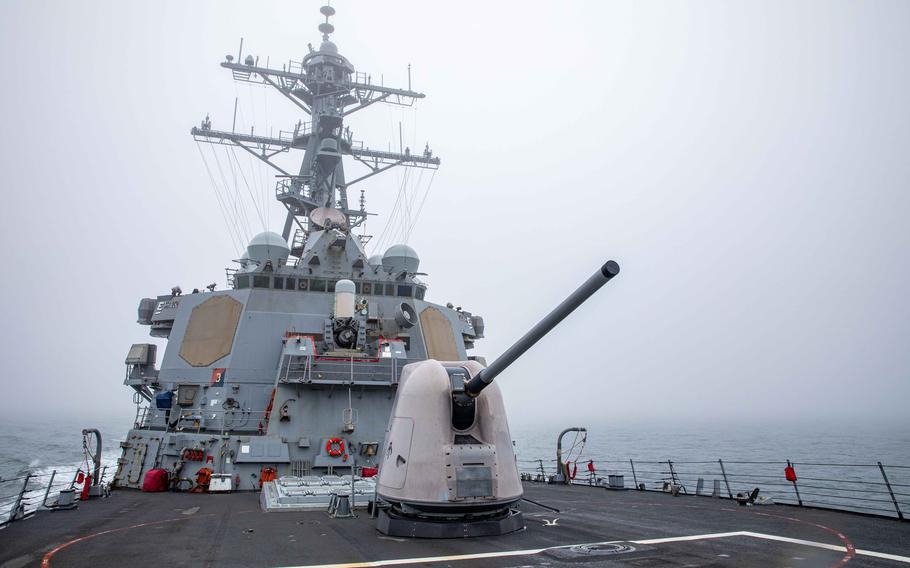
The guided-missile destroyer USS Benfold, seen here operating in the northern Pacific Ocean on July 31, 2023, was reportedly one of four ships deployed to monitor 11 Chinese and Russian ships near Alaska. (Justin Stack/U.S. Navy)
The U.S. Pacific Fleet over the weekend continued to track a flotilla of Russian and Chinese warships steaming through international waters off the coast of Alaska, a Navy spokeswoman said Monday.
The 11 warships cruised near the Alaskan coast and the Aleutian Islands in southeast Alaska last week, according to a joint statement from U.S. Sens. Lisa Murkowski and Dan Sullivan, Alaska Republicans, on Saturday. They said they received “detailed classified briefings” about the matter. The statement did not disclose how close the ships came to U.S. shores.
“This is a stark reminder of Alaska’s proximity to both China and Russia, as well as the essential role our state plays in our national defense and territorial sovereignty,” Murkowski said in the statement.
Neither senator’s office responded to phone calls from Stars and Stripes on Sunday.
The ships never entered U.S. territorial waters and were shadowed by four U.S. guided-missile destroyers – the USS John S. McCain, USS Benfold, USS John Finn and USS Chung-Hoon – and a P-8A Poseidon maritime surveillance aircraft, the Wall Street Journal reported Sunday.
The flotilla on Friday steamed through the southwestern portion of the Bering Sea, where it conducted an anti-submarine exercise that included the destruction of a mock enemy submarine, according to a news release that day from the Russian Defense Ministry.
The U.S. Pacific Fleet has a “myriad of joint capabilities to monitor” foreign operations in the region, said U.S. Pacific Fleet spokeswoman Lt. Cmdr. Christina Hough. She did not verify the Wall Street Journal report identifying the U.S. ships involved in tracking the flotilla.
The U.S. expects the Russian and Chinese navies to “operate within the region in accordance with international law” and plans to “continue to track them through the duration of their time in the region,” she told Stars and Stripes by email Sunday.
Beijing announced the “third joint maritime patrol in the western and northern waters of the Pacific Ocean” between China and Russia, according to a July 26 news release from the state-sponsored China Military Online. The operation “does not target any third party and has nothing to do with the current international and regional situation,” the release states.
The flotilla has traveled more than 2,300 nautical miles since the patrol began, according to the Russian Defense Ministry, and carried out included joint maneuvering drills and helicopter landing and take-off practice.
Sullivan called the flotilla an “incursion” and indicated the beginning of a “new era of authoritarian aggression led by the dictators in Beijing and Moscow,” according to the statement.
He compared its presence to a similar China-Russia operation last year and said the U.S. responding with four destroyers would send “a strong message to Xi Jinping and (Russian President Vladimir) Putin that the United States will not hesitate to protect and defend our vital national interests in Alaska.”
The crew of the U.S. Coast Guard cutter Kimball on Sept. 19 spotted three Chinese naval vessels and four Russian naval vessels – including a Chinese guided-missile cruiser and a Russian destroyer – operating as a “combined surface action group” within the United States’ exclusive economic zone near Kiska Island in the Aleutian Islands.
The Kimball, a 418-foot Legend-class national security cutter, monitored the ships’ activities.
The Chinese and Russian militaries over the past several years have deepened their ties, with frequent joint patrols and exercises, although China has neither endorsed nor condemned the Russian invasion of Ukraine.